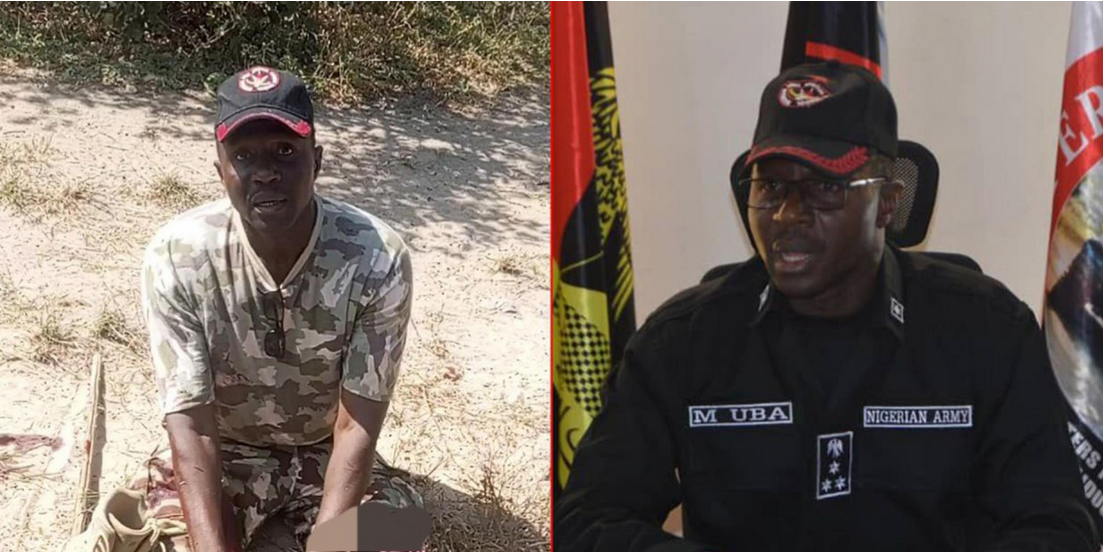
CONFIRMED: ISWAP Captured and Executed Brigadier General Uba as Nigerian Army’s Denial Unravels
As more details emerge, one fact is no longer contested: Brigadier General M. Uba, a high-ranking officer entrusted with leading frontline operations, was captured and executed by ISWAP, and the Nigerian Army attempted to hide the truth.
Abuja, Nigeria – November 19, 2025
Multiple independent news agencies and security analysts have now confirmed that Brigadier General M. Uba, commander of the Nigerian Army’s 25 Task Force Brigade, was indeed captured and later executed by fighters of the Islamic State West Africa Province (ISWAP).
The confirmation directly contradicts the Nigerian Army’s earlier statements dismissing the incident as “fake” and marks one of the most devastating blows to the military in recent years.
The confirmation follows the circulation of verified photos released through ISWAP’s propaganda outlet, Amaq, showing the senior officer in uniform before his capture and later seated on the ground, visibly wounded and in insurgent custody.
The images, authenticated by several international security correspondents, leave little doubt about the circumstances leading to his death.
A Coordinated Ambush and a High-Value Target
According to multiple sources, the general’s convoy was ambushed by ISWAP, along the Damboa-Biu road near Wajiroko in Borno State, leading to the death of two soldiers and two civilian joint task force members.
ISWAP claims its fighters captured Gen. Uba alive, interrogated him, and then executed him after the ambush.
The photo evidence and corroborating reports now align with ISWAP’s account, despite the military’s firm denials in the immediate aftermath.
“This is one of the most significant insurgent strikes in the history of the conflict,” one senior regional analyst told Peoples Chronicles. “Capturing a Brigadier General alive and executing him shows extraordinary operational capacity.”
Nigerian Army Caught in Falsehood
The Nigerian Army’s initial denial appears to have been intentionally misleading.
Army spokesperson Lt. Col. Onyechi Anele claimed Gen. Uba was never abducted and had “returned safely to base” after repelling the ambush with “superior firepower.” The Army even described ISWAP’s revelation as a “fake narrative.”
However, the release of the verified images, along with confirmations from various local and foreign media, has now exposed the denial as false. The Army has yet to issue a revised statement acknowledging the general’s death.
Security observers say the incident raises alarming concerns about transparency, morale, and public trust in the armed forces.
“The military has made denial a doctrine,” a conflict researcher noted. “But this time the truth was too big, too visual, too verifiable to bury.”
A Symbolic and Psychological Victory for ISWAP
The killing of a Brigadier General, one of the highest-ranking officers ever killed by an insurgent group in Nigeria, represents a major psychological and propaganda victory for ISWAP.
Beyond the brutality of the execution, analysts say the symbolic value is immense: the group has demonstrated capacity not only to ambush and overwhelm military units but also to identify, target, and eliminate high-ranking officers.
“This will embolden ISWAP and shake confidence within the Nigerian military,” an international security expert said. “It sends a message that no rank is beyond reach.”
Deep Intelligence and Operational Security Failures
Experts warn that the circumstances surrounding Gen. Uba’s capture reflect major intelligence and operational lapses.
Reports indicate the possibility that the general’s movements were compromised, either through intercepted communications or leaks within the system.
The fact that ISWAP was able to track him, seize him alive, and extract him from an active military operation exposes the fragility of Nigeria’s counterinsurgency architecture.
This case highlights several urgent concerns such as:
-
Poor operational secrecy
-
Possible communication interception
-
Weak convoy protection protocols
-
Inadequate response coordination during ambushes
“These failures are structural, not incidental,” a military scholar said. “Gen. Uba fell victim to problems that have plagued Nigeria’s war effort for years.”
Reverberations for Nigeria’s Counterinsurgency Strategy
The confirmed execution is expected to force a reckoning within Nigeria’s security establishment.
Experts say the incident will not trigger an overhaul of strategies, and pointed to past killings of High-ranking soldiers without any recourse, including the ambush and killing of Colonel Dahiru Bako in 2020, as well as former Army Chief Lt. Gen. Ibrahim Attahiru, whose death in a plane crash sparked debate about possible sabotage and denial by the army.
Politically, pressure is likely to mount on the federal government to confront the escalating insurgency with greater honesty and urgency.
In recent months, the United States government, through congressional hearings, State Department briefings, and direct diplomatic communications, has intensified its scrutiny of Nigeria’s handling of the terrorism that has plagued the country.
Senior U.S. lawmakers have openly criticized the Nigerian government for a lack of transparency, repeated denials later proven false, and complacency.
Following the confirmation of Gen. Uba’s execution, American officials are expected to increase demands for accountability. Washington has already signaled their intention to “annihilate” the terrorists, which Nigeria government have since then countered.
For affected communities and frontline soldiers, the event has deep psychological implications. Many fear that if a Brigadier General can be captured and killed, lower-ranking troops may feel even more exposed and unsupported.
A Harsh Spotlight on Military Accountability
The Army’s false denial, now publicly disproven, has renewed debates about accountability, communication, and institutional culture within Nigeria’s security forces.
For many Nigerians, this incident crystallizes a long-standing frustration: a military establishment struggling with terrorists who were at various time recruited into the army, transparency, and the continuous evolving of the terrorists faster than the state’s response.
As more details emerge, one fact is no longer contested: Brigadier General M. Uba, a high-ranking officer entrusted with leading frontline operations, was captured and executed by ISWAP, and the Nigerian Army attempted to hide the truth.